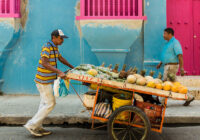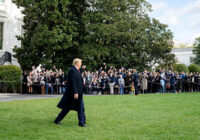Thus far, FARC politicians in congress are keeping up their end of the Havana accords and actively participating in Colombia’s democratic process.
During the months of August through October of last year, the Revolutionary Armed Forces of Colombia (FARC) guerrillas transformed into a law-abiding political party. Giving up their weaponry and triggering the demobilization of combatants as agreed upon in the Havana peace accords, Latin America’s longest-active rebel group entered Colombia’s democratic scene as a refashioned political force. But the transformation wasn’t wholehearted. At the FARC’s first congress as a political party in September 2017, the majority of militants, led by key members of the governing body, voted in favor of maintaining the group’s acronym under a new name — the Common Alternative Revolutionary Force.
Two years after the decisive peace accords were signed in Bogotá, FARC party cadres occupy eight seats in the Colombian congress, out of the 10 that were agreed upon in the Havana peace deal. Meanwhile, the majority of foot soldiers are being reintegrated into civilian life through reinsertion zones spread throughout the countryside. However, ideological divides within the guerilla group continue to exist within the political party and now threaten the future of the FARC. When it comes to the implementation of the peace deal, the now-political cadre of the FARC can be broadly divided into two groups, the skeptics and the optimists.
The skeptics, like Ivan Marquez, Jesus Santrich, Joaquin Gomez and Hernán Darío Velásquez (known as “El Paisa”) believe that the Colombian government will not uphold the commitments of the Havana peace deal. Therefore, this group of former combatants, who belong to the more militant sectors of the FARC political party, is hedging its bets by maintaining readiness to go back into clandestine economic activities and guerilla warfare at any time.
On the other hand, the optimists, including the FARC’s former commander-in-chief, Rodrigo Londoño (known as Timochenko), Pablo Catatumbo and Pastor Alape, are much more committed to the success of the Havana process and to a full transition into political life. Likewise, the former combatants are far less willing to go back to the guerilla camps in the jungle. Thus far, this sector of the FARC has complied with the law and kept up its end of the peace agreement through regular appearances before courts and commissions.
During the political party’s foundational conference, when the group’s cadre and members were choosing a new name for their political movement, the skeptics prevailed over the optimists in their effort to maintain the FARC acronym instead of choosing a brand new party name. Ivan Marquez and other leading skeptics opposed the name New Colombia, championed by the optimists, because they argued that maintaining the name FARC would make it easier to transition back into a guerrilla formation if ultimately necessary.
Schism
The schism within the FARC, which is palpable today, has been in place since the passing of former commander-in-chief, Alfonso Cano, in 2011 during a military offensive in the early years of Juan Manuel Santos’ presidency. The election for Cano’s successor led to a clash between FARC leaders Ivan Marquez and Rodrigo Londoño, a rivalry that was still evident when the FARC leadership was discussing what former combatants would do following the demobilization. Even though Londoño would ultimately become FARC’s commander, Marquez remained a hardline member of the FARC’s secretariat and would gain important allies within the guerilla’s cadre. Eventually, Marquez became the FARC’s second-in-command and would lead the guerilla delegation during the years-long Havana negotiations.
Over this summer, a handful of left-wing leaders throughout Colombia — including the presidential runner-up Gustavo Petro, as well as Senators Ivan Cepeda and Aida Avella — strongly urged Ivan Marquez to take up his seat as senator at the swearing-in ceremony on July 20. However, Marquez refused to become the FARC’s political leader in congress. A few weeks before the ceremony, Marquez left Bogotá and joined former FARC combatants in southern Colombia, citing the fear of prosecution after the arrest and extradition process advanced against his close ally Jesus Santrich on drug trafficking charges, which happened to be one of the guerrillas’ preferred financing methods.
Even though Marquez led the FARC negotiating team in Havana, he is a vocal critic of the ongoing implementation of the peace deal. Marquez argues that the government is not holding up its end of the bargain, which is why he moved to the southern Caquetá department in the Amazon region to join with other FARC leaders. Moreover, throughout Colombia’s southern departments, such as Caquetá, Putumayo and Nariño, there are several camps for combatants demobilized as part of the peace process amongst whom Marquez feels at home, as well as FARC dissident groups that never demobilized and are still militarily active.
While some claim that Marquez hides for personal safety, and others argue that he should be arrested, on September 22, Marquez and “El Paisa” sent a letter to the Colombian senate. In it, the discontented FARC leaders outlined the reasons for their hiding, voicing their mistrust of the current administration, claiming that the government is not meeting its financial obligations toward demobilized guerillas, and explaining what they call the “betrayal” of the Havana process.
What’s Next?
Naturally, Marquez and his current whereabouts have become a subject of discussion in Colombia’s political circles. This issue is particularly contentious given that FARC cadres have to respond to the country’s Special Jurisdiction for Peace (JEP), an ad hoc court that was created as part of the Havana peace accords. Even though Marquez has regularly sent written statements to the court via his lawyers, he has not appeared before it himself. However, the same cannot be said of Marquez’s close associate “El Paisa,” who has refused to appear before the JEP court system.
It is no secret that Ivan Marquez maintains communications with dissident guerrilla groups that have refused to participate in the peace process from the outset. Moreover, it is possible that he might be aiding in the structuring of new guerrilla fronts along Colombia’s Caribbean coastline, along the Magdalena River valley or along the southern border with Ecuador. Given that Marquez was the commander of the FARC’s Caribbean block for several years, and that he has powerful allies in neighboring Venezuela, there is widespread speculation surrounding his activities, whereabouts and future plans. At this point, Ivan Marquez is the most prominent FARC leader operating along the margins of the Havana framework. Thus, all former combatants and dissidents who are unhappy with the implementation of the Havana agreement see in Marquez a willing fighter who prefers the guerilla camps to the halls of congress.
Thus far, FARC politicians in congress are keeping up their end of the Havana accords and actively participating in Colombia’s democratic process, in spite of the fact that President Ivan Duque’s party has been very hostile to the implementation of parts of the peace process. On the other hand, while figures like Ivan Marquez, Jesus Santrich and “El Paisa” have stated their intentions of complying with the accords, their actions suggest otherwise.
President Duque, who prides himself in being a law-and-order leader, is no fan of the Havana deal. Yet Duque is well aware of how delicate the unfolding situation is and has stated that he is considering the issue of an arrest warrant against Marquez if the FARC leader does not comply fully with the terms of the peace deal. Nevertheless, as long as Marquez remains in hiding, issuing an arrest warrant would guarantee that the FARC leader goes back in clandestine activity, further emboldening the skepticism of dissident guerrillas throughout Colombia and creating more uncertainty around the country’s unstable peace.
The views expressed in this article are the author’s own and do not necessarily reflect Fair Observer’s editorial policy.
Support Fair Observer
We rely on your support for our independence, diversity and quality.
For more than 10 years, Fair Observer has been free, fair and independent. No billionaire owns us, no advertisers control us. We are a reader-supported nonprofit. Unlike many other publications, we keep our content free for readers regardless of where they live or whether they can afford to pay. We have no paywalls and no ads.
In the post-truth era of fake news, echo chambers and filter bubbles, we publish a plurality of perspectives from around the world. Anyone can publish with us, but everyone goes through a rigorous editorial process. So, you get fact-checked, well-reasoned content instead of noise.
We publish 2,500+ voices from 90+ countries. We also conduct education and training programs
on subjects ranging from digital media and journalism to writing and critical thinking. This
doesn’t come cheap. Servers, editors, trainers and web developers cost
money.
Please consider supporting us on a regular basis as a recurring donor or a
sustaining member.
Will you support FO’s journalism?
We rely on your support for our independence, diversity and quality.







